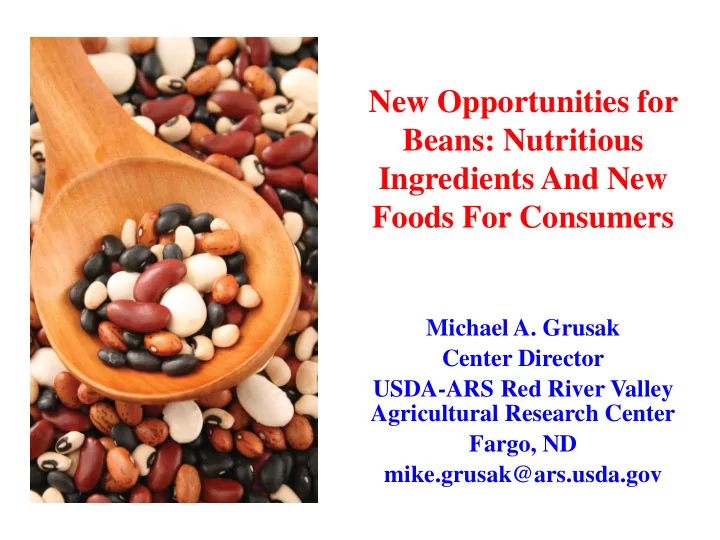

New Opportunities for Beans: Nutritious Ingredients And New Foods For Consumers Michael A. Grusak Center Director USDA-ARS Red River Valley Agricultural Research Center Fargo, ND mike.grusak@ars.usda.gov
US Dry Bean Production Pinto – 42% Navy – 17% Black – 11%
Bean Photos • How do we get more beans in the food supply? • What do consumers want? • What can the food industry supply? • Can we help to make beans the ‘Healthy Choice’?
Beans offer healthy choices • Protein • Dietary Fiber • Carbohydrates • Low Fat • Potassium • Iron • Folate
Beans offer healthy choices Data from USDA 2015
Beans offer healthy choices Data from USDA 2015
Eating ‘Healthy’ – How hard is it?
Make the ‘Healthy’ choice the EASY choice TECHNOLOGY CONVENIENCE 25 Minutes 2.5 Minutes
Consumers don’t have time to cook
Convenience vs. Nutritional Quality The study used data from the 2000-2012 Nielsen Homescan Panel, a longitudinal study of food and beverage CPGs (Consumer Packaged Goods) purchased by US consumers. Yearly sample size ranged from 34,000 to 62,000 households.
Convenience vs. Nutritional Quality
Convenience vs. Nutritional Quality
Convenience vs. Nutritional Quality Percent Exceeding Recommendation
Convenience vs. Nutritional Quality Percent Exceeding Recommendation
Beans offer healthy choices • Protein • Dietary Fiber • Carbohydrates • Low Fat • Potassium • Iron • Folate
Consumers are struggling with media messages… • Beans have > 3x more fiber per serving than whole grains • Beans have ~ 4x more protein per serving than whole grains (2x more than quinoa) • Many dry bean varieties have more antioxidant activity than blueberries!
What can the Food Industry do?
What can the Food Industry do? Top 10 Food Trends for 2016 Whole Bean Ingredients Are On Trend!
What can the Food Industry do? Top 10 Food Trends for 2017 Whole Bean Ingredients Are On Trend!
Beans increase satiety Kristensen et al. (2016) Food and Nutrition Research
Beans/Pulses offer sustainability Beans: • ‘Fix’ atmospheric nitrogen • Improve soil fertility • Have a small water footprint • Improve soil structure • Improve soil biodiversity
Beans have a small water footprint Beans require much less water to produce an equivalent amount of product than other legumes or various animal sources of protein.
It’s time to think differently about beans! Cooked, dehydrated whole bean ingredients can deliver a minimum serving of beans in almost any product. • Can increase palatability and acceptability of whole grain foods • Can make the nutrition of beans easy to enjoy in common/popular foods • Can help Americans meet the dietary recommendations for beans and fiber
The possibilities are endless…
Innovations: North America
Innovations: Europe
Innovations: Australia/New Zealand
International Year of Pulses
Where do we go next?
What Are Our Opportunities? – Improve Public Health
What Are Our Opportunities? Flour Grits Molecular Crop Bean Food Analytical Production Processing Processing Breeding Agronomy Food Technology Public Health
Opportunities for Breeding Consumer Awareness • Taste • Nutrition/Health Food Technology • How to Process for Different Product Applications • Percent Inclusion of Bean Ingredients • Retention of Nutrients/Bioactives Breeding & Agronomy • Trait Evaluation • Impact of Agronomic Practices & Environment on Traits of Interest • Cultivar Development for Ingredient Applications
New Opportunities for Beans: Nutritious Ingredients And New Foods For Consumers Michael A. Grusak Center Director USDA-ARS Red River Valley Agricultural Research Center Fargo, ND mike.grusak@ars.usda.gov
Recommend
More recommend